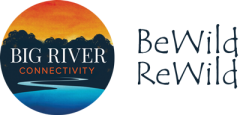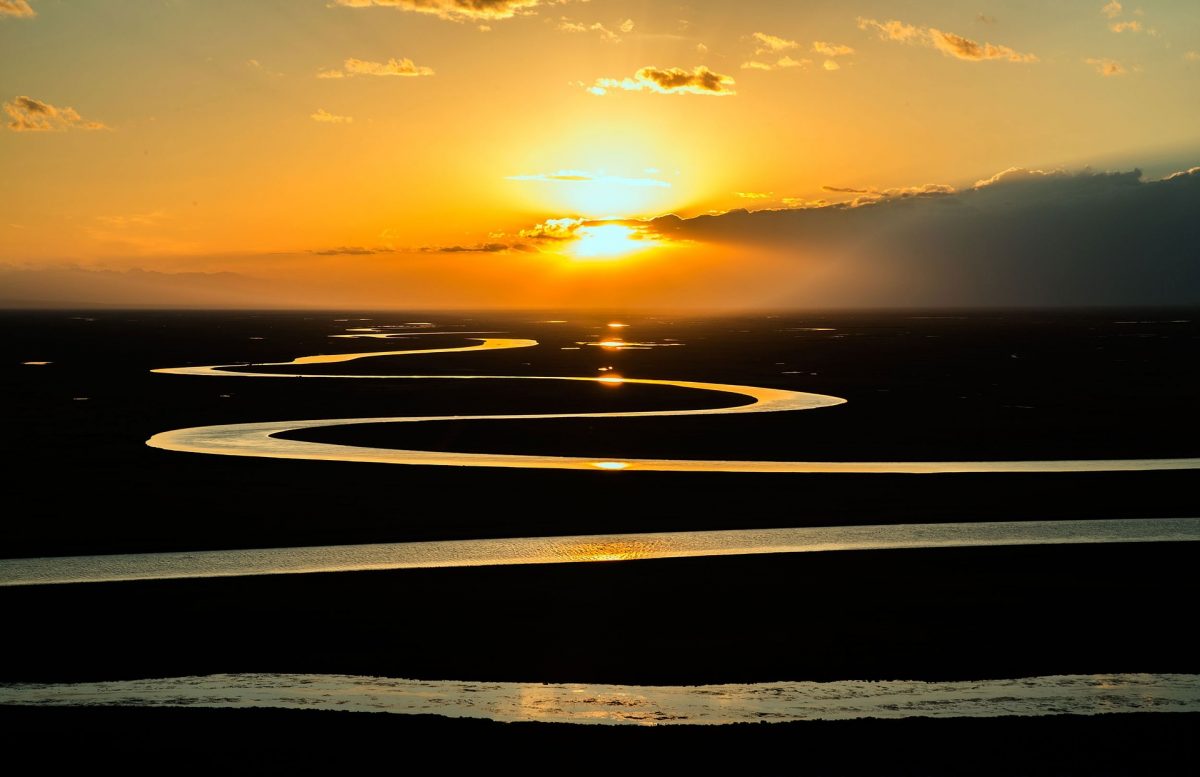
Welcome
...to "ground zero for rewilding".
We are a loosely-knit group of volunteers with a passion for wildness. Our conversation is rooted in the early 1990s with inspiration from Rachel Carson, Arne Naes, Ray Dasmann, Linda Hogan, Thomas Merton, Dave Foreman, Terry Tempest Williams, Gary Snyder, Henry Beston, David Quammen, Robert Bly, Stephanie Mills, Paul Shepard, Scott Nearing, Aldo Leopold, Henry David Thoreau, and others. Wild Earth Journal brought it all together. Reconnect-Restore-Rewild became our mantra. The dream was always for those with expertise and experience in this process to come here and save us from the ravages of overdomestication. But no one came. So in that vacuum emerged the BeWildReWild movement and a startling realization that we must save ourselves.
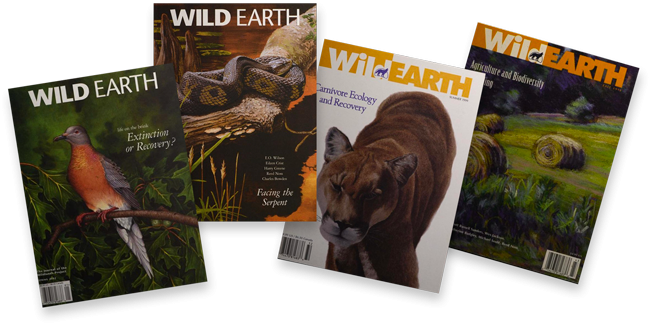
The Good, the True, the Beautiful
by Greg Costello
When I think of wildness, wild places, and wild things, the first images that come to mind are craggy peaks, vast forests, dark jungles, and large, charismatic creatures often imagined but seldom seen. I don’t think of Iowa.

Humans are the
Great Domesticators
Our species has long engaged in a struggle to subdue and domesticate the world, and much has been gained in that process; but important things have also been lost. We want to sort through those gains and losses and find a more appropriate balance between caring and not caring, holding on and letting go. The purpose is to experience an increasing level of trust for wildness and to discover a feeling of personal liberation as we allow more freedom for that which is beyond human.
What is wildness? How is it different from wilderness? Is wildness a manifestation of trust and non-expectation of outcome? To what extent is domestication based in a fear of the unpredictable and the unfamiliar? Can we learn to be more trusting and more trustworthy? Could a better understanding of wildness increase our appreciation for wilderness? And would that lead to a greater awareness of ourselves and ALL that lives around us?
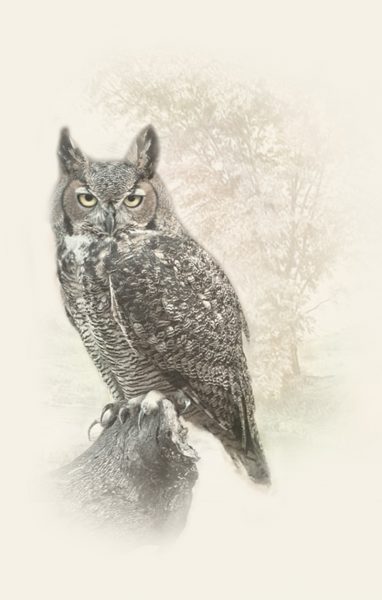
Passion
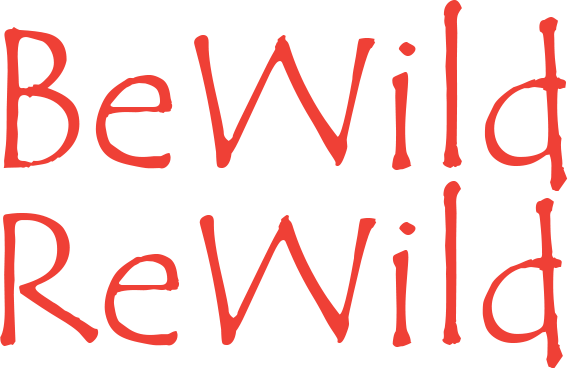
BeWildReWild is a loosely-knit group of volunteers with a passion for wild things. It is also a special fund for the purpose of exploring three questions: What do you/we mean by wild? What lifestyle changes are needed for us to live within the bounds of sustainability? How can we create a wilder, more beautiful, more biologically diverse, and a more enduring Mississippi River Watershed? And here on this website, BeWildReWild is a place for visioning, debating, storytelling, teaching, and learning.
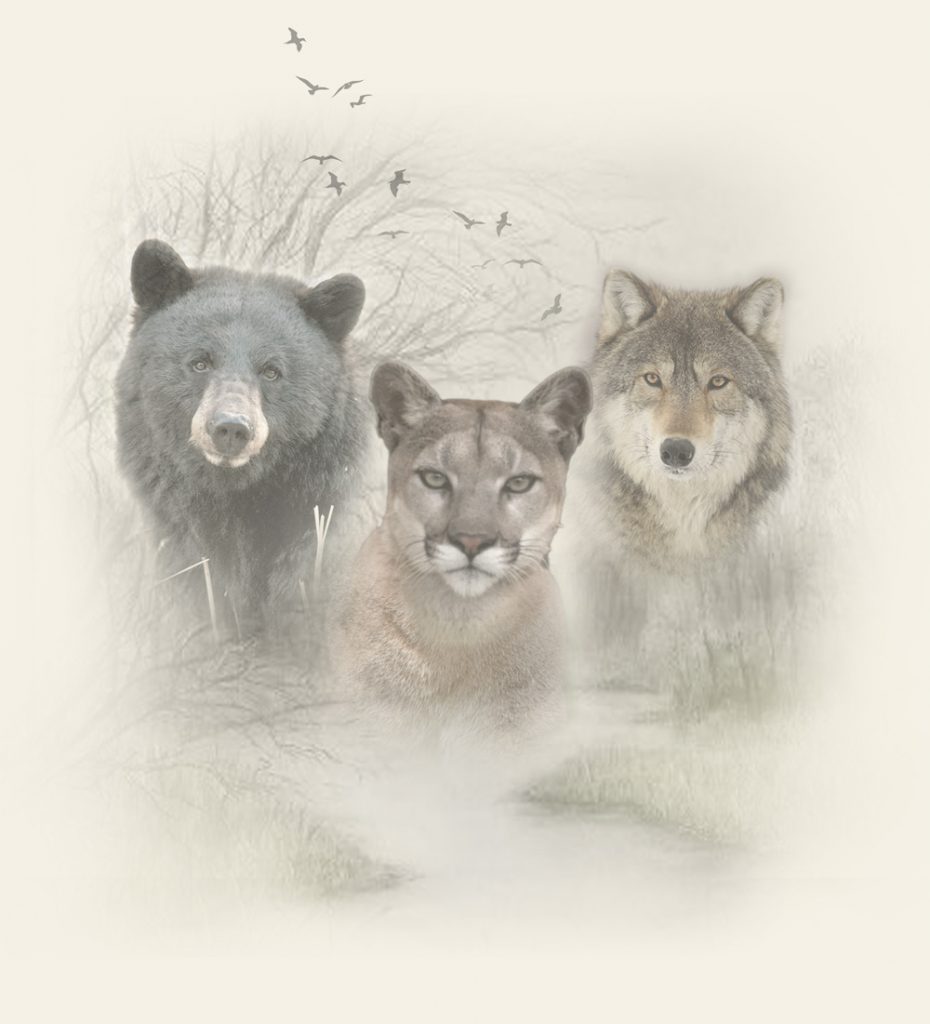
Vision
BIG RIVER CONNECTIVITY is our vision for a wilder, more beautiful, more biologically diverse, and a more enduring Mississippi River Watershed.
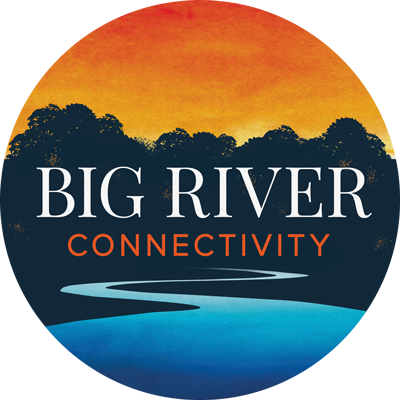
It is a plan for shrinking the Gulf of Mexico’s Dead Zone while allowing the recolonization of apex predators and keystone species essential to a balanced ecosystem. And it is about liberating humans and nonhuman otherness from the ravages of over domestication.
The Corn Belt is ground zero. Permanently rewilding floodplains and steep slopes is a priority. It is also critical that a meaningful acreage of annual crops be replaced with perennials. Humans are consuming more than can be replenished. Adjustments must be made in both the city and the country. Significant change is needed for us to live within the bounds of sustainability. We must redefine what it means to be happy and successful. We must focus on needs rather than wants. Consumers, governments, and academia must unite to create a lower input culture. Once that process is underway, farmers will create a lower input agriculture. Other industries will follow suit.
Great potential exists for connecting large core habitat areas like the four state Driftless Region, the four state Ozark Plateau, and the four state Loess Hills Area. Many smaller cores are needed as well. The Arkansas, Missouri, Mississippi, Illinois, Ohio, Tennessee, and Red Rivers are primary corridors across our vast watershed. Smaller rivers like the Platte and Niobrara are equally important for expanding the Reconnect-Restore-Rewild effort previously existing mainly outside the heartland. Groups like Iowa Natural Heritage Foundation and The Nature Conservancy do an incredible job of restoring landscapes. Our emphasize is on reconnecting and rewilding…and we take a total watershed approach. The BIG RIVER CONNECTIVITY goal is to get everyone involved and to keep the game going. We are visionaries and story tellers. We are here to learn and teach. The mission is both inspirational and overwhelming.
Rewilding The Heartland: Restoring Big River Connectivity and Rewilding The Mississippi River Watershed
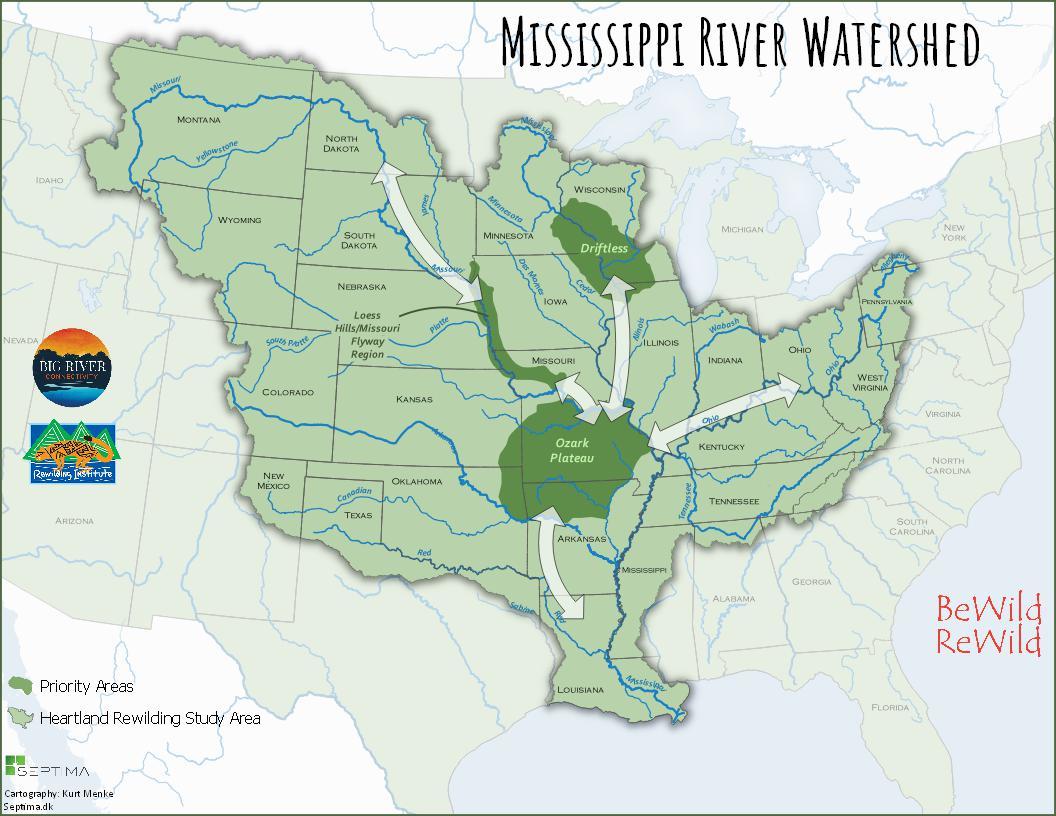
Watch / Learn
These artists have received Community Art Gathering Grants from the BeWildReWild Fund.
Projects
Website and logo development for BeWildReWild and BIG RIVER CONNECTIVITY.
Produced by Sydney Pursel. Focus on the benefits of TRUSTING WILDNESS. Two large paintings illustrating BIG RIVER CONNECTIVITY. Ready for display in December 2019.
A thought-provoking 7-minute film about a small but important creek in Jefferson County, Iowa and what happened when it was altered. Written and directed by award-winning documentarian Dick DeAngelis.
Produced by Autumn Rozario Hall. Resulting in the production of paintings and art showing Connectivity to Iowa Lands, a seed starting and planting workshop, and an artist talk. Will be completed by Summer 2020.
Artwork produced by Lance Foster, Reuben Ironhorse-Kent, Kayla 'WhiteKnife' Kent, Sydney Pursel and Philip Pursel. To be displayed at Effigy Mounds National Monument visitor’s center August 31-October 31, 2019.
Produced by Nitin Gadia. Resulting in a large vision map of the entire Mississippi River Watershed, a Midwest map connecting the Driftless, the Ozarks, and the Loess Hills, plus a third map connecting the Ozarks with South Central Iowa via the Chariton and Missouri Rivers. Will be completed by November 2019.
Developed by Mary Young Bear. Workshops on basket making, twined bags, cattail mats, bone dice and wooden bowl/spoon carving. Held at the powwow grounds September 21-22, 2019.
Coordinated by Leland Searles. Theme of Cores – Corridors – Communities. Resulting in computerized mapping of the Iowa River Corridor. Ready to display in September 2019.
A KHOI Radio Series developed by Mark Edwards and Ursula Ruedenberg. Three, hour-long programs covering the themes of BeWildReWild. To be aired in December 2020.
Produced by Courtney Chandrea. Resulting in an illustrated ebook guide about exploring, understanding, and TRUSTING WILDNESS. Illustrated by Erica Wilson. Ready in February 2020.
Coordinated by Leland Searles. What began as an effort to create maps of a few watersheds in Iowa has become a full-blown mapping that links the entire Mississippi-Missouri basin from north to south and east to west. A vital part of this is the online digital map of Iowa, developed over months of effort by Nitin Gadia. Ready to display in December 2019.
Poet and artist, Joseph S. Plum, will create a series of seven paintings with quotes from his Bardic poetry. The series will explore how the concepts of wildness, sustainability, and biological diversity work together to create a communal artistic space. Ready in 2020.
Award-winning artist and writer, Emily Lupita, will create a series of watercolor paintings that depict her childhood living off the grid in the natural world. The paintings will be the basis for a children’s book that will teach today’s youth about the lifestyle of sustainable natural living. Ready to display in 2020.
Living History Farms, located on a 1700 Ioway site, will hold an annual loway Culture Day on July 11, 2020. This day will explore loway history and culture. In conjunction, an loway Artist Exhibition will include at least six pieces of artwork and continue through Oct 16. Artist Sydney Pursel will speak at the exhibition opening.
The grant-funded work under this proposal has resulted in a PowerPoint presentation and several spinoff efforts to make its content public. As we establish new forms of activity and communication (in part because of public health concerns over COVID-19), our methods of presentation also adapt. In the same way, natural systems must adapt to change, and that flexibility is a natural requirement. The first presentation was in February at the Sustainable Living Coalition's Ecobarn in Fairfield, Jefferson County, and a second talk occurred on Sept. 15 at the Des Moines Izaak Walton League.
A three-month grant to Nitin Gadia and Leland Searles extends their mapping efforts to major river systems throughout the central river basins of the U.S. The Mississippi and Missouri Rivers are the “backbones” of this 32-state plan.
Fourth Wall Films will create “Over & Under: Wildlife Crossings”, a broadcast-quality 7-10 minute short film, depicting the need for wildlife crossings in Iowa and the Mississippi River Watershed. The film will showcase a small number of successful crossings projects in Iowa and the immediate region. Ready for display in October 2020.
Effigy Mounds National Monument announces a series of special events celebrating the American Indian tradition of storytelling in winter. Winter Stories will occur on Saturday and Sunday afternoons beginning February 22, 2020 through the end of March.
The Sustainable Living Coalition received a grant to plan the first BeWildReWild conference of 2020 to be held at the Fairfield Arts and Convention Center Sondheim Theater on Saturday, April 11; however, due to COVID-19, it became evident that this project had to change focus. They requested a change to the grant as to have Dick DeAngelis create two videos to support the Wildlife Crossings Project and also produce a short film to support the discussion surrounding the concept of BeWildReWild.
This second grant to The Sustainable Living Coalition sponsors the formation of a Southeast Iowa group to review and improve our Cores-Corridors-Crossings mapping with boots on the ground input. And they will become additional Storytellers for the BeWildReWild/BIG RIVER CONNECTIVITY movement.
A 20-minute film about how Iowa can create a wilder, more beautiful, more biologically diverse state. Written and directed by award-winning documentarian Dick DeAngelis. Ready to view March 2021.
Autumn Rozario Hall will create a series of constellation based paintings intended to accompany the KHOI grant project audio clips for the BeWild ReWild website. Part 1: Ready to view Fall 2020. Part 2: ready Fall 2021.
Award-winning artist and writer, Emily Lupita, will create a series of watercolor paintings that depict her childhood living off the grid in the natural world. The paintings will be the basis for a children’s book that will teach today’s youth about the lifestyle of sustainable natural living. Ready to display in 2021.
The Midwest Environment Education Conference (MEEC) is being held at Luther College in Decorah, Iowa July 26-29, 2021, with a backup plan to move to a virtual format if needed. The theme is “Exploring Community: Land, Water, People” and will feature keynote speaker Robin Wall Kimmerer, author of Braiding Sweetgrass. The keynote and sessions will focus on the ideas of re-defining community to include all land, water, and people, and building healthy, resilient, vibrant communities for all.
Fourth Wall Films will create a broadcast-quality 10-12 minute short film that will profile a successful partnership between a land-owner and the permanent Wetlands Reserve Program. The film will also illustrate how this program addresses the concept of Cores and Corridors, and show how rewilding benefits people and the environment. Ready for viewing June 2021.
In this three-month grant, Kelly Madigan will use the LoHi Trail and its hundred + identifiable stakeholders to work toward common goals, including preservation of the Loess Hills, conservation and access easements, increase public awareness and a growing public will toward protection, and increased economic opportunity for the poverty-stricken towns along the spine of the LoHi. Initial framework ready March 2021.
In this three-month grant, Kelly Madigan will continue on her trajectory of being an active contributor and collaborator with the community of conservation organizations and concerned citizens who live in and love the Loess Hills. The next phase of her grant will enable further exploration and development. July 2021.
Fourth Wall Films, via Truth First Film Alliance, Inc. will create a broadcast-quality visually-creative 28-minute film that will profile examples of diverse individuals and/or groups of individuals who look beyond that which may be socially or politically divisive to collaborate on an effort to create a wilder, more beautiful, more biologically diverse, and a more enduring Mississippi River Watershed.
Ursula Ruedenberg and Stephanie Schubert, both of Pacifica Affiliate Network, will produce a 1-hour radio program/podcast advancing the Wildness/Rewilding conversation resulting from interviews gathered during the 2-day Iowa Nature Summit.
BeWildReWild is one of 5 Nature's Heros Sponsors who granted $5,000 to Drake University for a two-day conference on November 16-17, 2023 at Drake University Olmsted Center bringing together a broad spectrum of nature enthusiasts and organizations who share a common goal - to preserve and protect nature's diversity.
David Hoferer, Professor of Biology and Environmental Science at Briar Cliff University, proposes working with the Northwest Iowa Sierra Group of the Sierra Club in Sioux City, IA, to organize, promote, and host a one-day event in spring 2024. The event will focus on the question “What is Wild in Northwest Iowa?” It will be marketed to specific target audiences and will be publicized in the tri-state area of Siouxland.
IEC will pursue a number of strategies to engage Iowans in imagining a different future for our state – a future that is a more diverse landscape that can support all life. Strategies include sponsorship of the Iowa Water Watch newsletter, hosting Water Watch and Cost of CAFO events, and showcasing 5 films to share the vision of BeWildReWild.
KHOI will develop a regular program covering issues to nature and the environment, a series of in-person film programs that invite public participation, topical discussion sessions, and a program featuring Poetry and Writing inspired by a BeWildRewild prompt.
This grant of $25,000 resulted from several conversations with Doug Harr of Iowa Audubon regarding a definition for desirable bird habitat. Its purpose is to expand that dialog throughout Iowa's birding community.
Fourth Wall Films, via Truth First Film Alliance, Inc., requests a supplemental grant to fund five FREE public screening/discussion events featuring the new 28-minute documentary “Moved by Waters”. The key purpose of the film is to demonstrate to viewers that what unites us is more important than what divides us. The people and organizations in these stories cross boundaries that impede the inherent spontaneity and self-regulating qualities of wild nature.
Practical Farmers of Iowa (PFI) will continue to help lead the adoption and integration of conservation on working lands; integrating food, nature, and contributing to vibrant farms and communities through farmer-led education field days and conference sessions.
UNO faculty, students and community members will engage in a yearlong project in which students script and produce two short films approximately eight to 12 minutes long. The films will be screened at the Benson Theater at no cost to the public in summer 2025 in a public showcase with a panel discussion and Q&A afterwards. In addition, a short auxiliary documentary film will be created to document the entire process of bringing the project from inception to production.
Fourth Wall Films requests a grant to produce a provocative broadcast-quality visually creative 12-15 minute short film “Enough?” that will examine the equally important environmental challenges of poor water quality and a lack of biodiversity, and suggest solutions for viewers to consider. Solutions include the adequate restoration of natural systems (woodland, wetland, grassland) and the meaningful reduction of human consumption. Behavioral changes could include the large inventory of domestic animals (pets and livestock), and human attempts to satisfy all wants instead of needs.
Together, IEC and PFI will engage in year-long discussions and partnership opportunities that advance the central theme of building a wilder, more beautiful, more biologically diverse, and more enduring Mississippi River Watershed.
Together, IEC and PFI will engage in year-long discussions and partnership opportunities that advance the central theme of building a wilder, more beautiful, more biologically diverse, and more enduring Mississippi River Watershed.
The Iowa Environmental Council (IEC) invites BeWildReWild to serve as the Premier Sponsor of our 2026 Annual Conference on September 29 at Drake University in Des Moines. IEC’s Annual Conference is Iowa’s largest gathering of environmental leaders, policymakers, advocates, business voices, students, and community members committed to protecting and restoring Iowa’s land, water, and public health.
The following three grants mark the beginning of a more focused BeWildReWild commitment to the bold BIG RIVER CONNECTIVITY Vision for a wilder, more beautiful, more biologically diverse, and a more enduring Mississippi River Watershed. We began this journey at Ground Zero in Iowa, but now our attention must spread outward. The Rewilding Institute brings some of North America’s original Rewilders into the Arkansas-Illinois-Mississippi-
–Roger Ross Gipple
Our goal is to develop tools, materials, and networks to foster biophilia in Iowans. What we accomplish in Iowa can by extension be applied to other states in the extensive Mississippi River Watershed, and beyond to the many states and provinces of the world where intensive agricultural modification calls for a rewilding, reclaiming, rejuvenating Half-Earth approach. Phase 1 (6-months), we propose to develop educational materials focused on supporting Iowa teachers to engage students in biodiversity, conservation, and design-thinking. We plan to conduct teacher professional learning online, and in-person if possible, and to plant a Half-Earth Project Iowa Ambassador Program.
Project Coyote, a national organization with growing connections in the Midwest, is well-poised to promote human-wildlife coexistence (coyotes and other wildlife) in contexts from urban to suburban and exurban to rural. Project Coyote aims to strategically grow capacity in the region, raise public awareness and fill critical knowledge gaps in best practices for communicating and promoting coexistence through public education, proactive conflict prevention and close collaboration with The Rewilding Institute over the course of 6 months (March-August 2021).
Adding North America’s Grasslands, Savannas, and Central Waterways – Our Continent’s Greatest Watershed – to the Continental Rewilding Map
The Rewilding Institute (TRI) is partnering with conservation leaders in the prairie states and provinces and BeWildReWild to sketch and advance a vision of wildlife and wilderness recovery across the Great Plains and throughout the Mississippi River basin. TRI will promote a Great Plains Wildway and connecting riverine wildways and avian flyways through Rewilding Earth, an expanded second edition of Dave Foreman’s landmark book Rewilding North America, and social media and field podcasts. Maps, stories, and presentations ready for viewing December 2021.
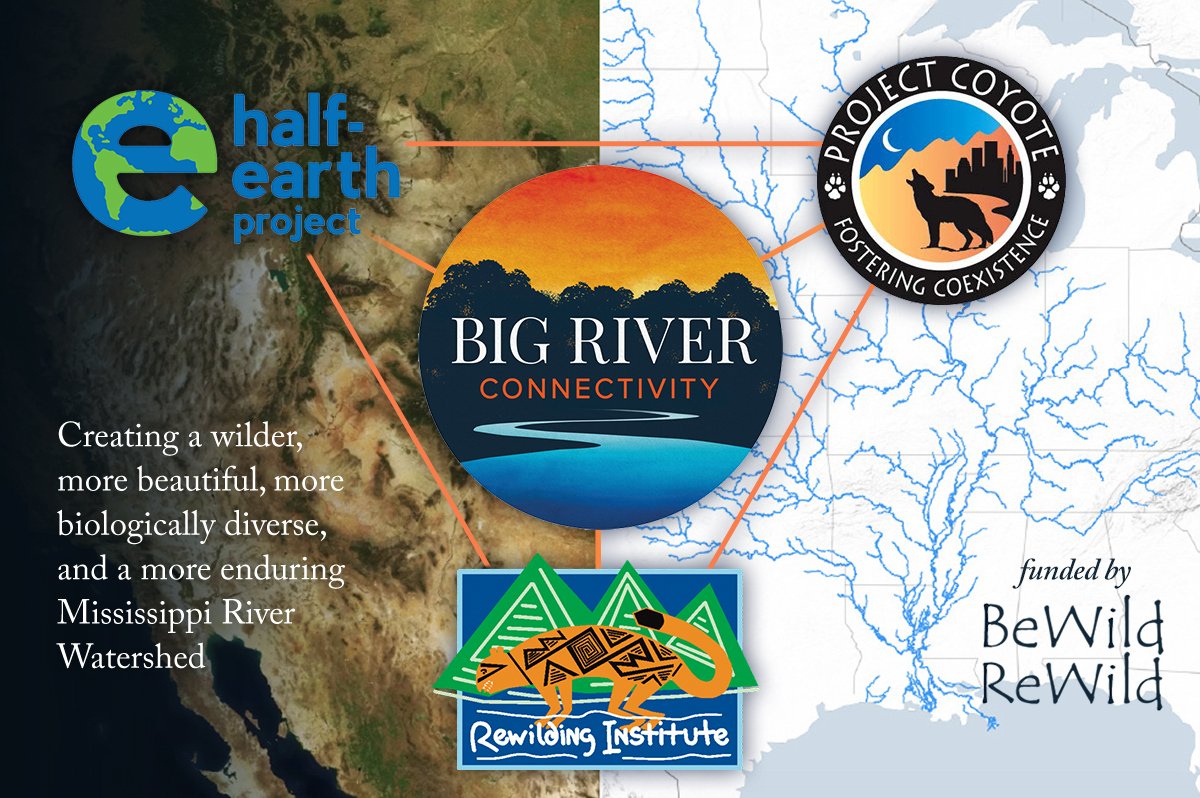
We are pleased to announce two new hires
This BeWildReWild grant provides $170K during year one for two full-time employees living in the Des Moines area and working to advance our BIG RIVER CONNECTIVITY Vision of Cores, Corridors, Crossings, and Coexistence throughout the Mississippi River Watershed.
–Roger Ross Gipple
FRANCISCO J. SANTIAGO-ÁVILA, PhD
SCIENCE ADVISORY BOARD
Francisco J. Santiago-Ávila earned his PhD at the Nelson Institute for Environmental Studies at the University of Wisconsin-Madison. He holds Masters degrees in environmental public policy and environmental management from Duke University. His past research has focused on valuation of non-wood forest wealth, the prioritization of ecosystems for conservation in Latin America and the Caribbean, and measuring the impact of protected areas on land cover change for international organizations such as the World Bank and the Inter-American Development Bank. As part of the Carnivore Coexistence Lab at UW-Madison, Fran’s research has revolved around the integration and application of environmental and animal ethics to coexistence with wildlife, the evaluation of the mortality impacts and functional effectiveness of policies, and interventions aimed at improving coexistence with large carnivores (focusing on the gray wolf).
Francisco’s most recent work evaluating the use of lethal methods for wolf control in Michigan suggests that killing wolves does not reduce the risk of attacks on domestic ungulates (cows, sheep) any more than non-lethal interventions for treated properties. That research also found evidence of potential increased risk of attacks for adjacent properties, thus advocating for curtailing lethal methods for those purposes in the state. He also recently published an ethical examination of the laws and regulations governing gray wolf management in the state of Wisconsin, concluding that current management is blatantly dismissive of the interest of wolves and thus provides inadequate oversight for ethical interspecies coexistence. His main objective is to reform human-wildlife interactions by embedding in people the acknowledgment of moral standing for individual nonhuman animals.
Read this recently published paper co-authored by Francisco and fellow Science Advisory Board member Adrian Treves:
Santiago-Ávila, F.J., Chappell, R.J., Treves, A., 2020. Liberalizing the killing of endangered wolves was associated with more disappearances of collared individuals in Wisconsin, USA. Scientific Reports in press.
KELLY
BORGMANN
Kelly Borgmann grew up on a historic farm in rural east-central Indiana. Spending her days playing in the woods and taking care of the land gave her a deep appreciation of nature while participating in 4-H and FFA taught her how to be a productive member of rural and agricultural communities.
Following her passion for wild nature, Kelly earned an undergraduate degree in Wildlife Biology from Ball State University. She then spent the next several years traveling and learning about human connections to nature in myriad contexts. She has spent time working as a field guide in South Africa, a human-manatee interactions researcher for the U.S. Fish and Wildlife Service in Florida, a National Park Service cowgirl in Montana, and a conservation educator in Ohio. Through all these adventures she maintained and grew her love of coexistence and connecting people to nature.
Deciding to deepen her knowledge of human-nature interactions, Kelly entered a dual degree program to obtain a Masters of Public Affairs and a Masters of Science in Environmental Science from the School of Public and Environmental Affairs at Indiana University. Her focus has been on reducing conflict at the rural-wildland interface and building proactive coexistence programs. In her role as Big River Connectivity Coexistence Coordinator, Kelly promotes compassionate coexistence and rewilding landscapes across the Midwest.
When not working to create a better world for all life, Kelly can be found hiking with her dog, reading a good book, or exploring the world through art and photography.
The BeWildReWild Forum
 BeWildReWild is a loosely-knit group of volunteers with a passion for wild things. It is also a special fund for the purpose of exploring three questions: What do you/we mean by wild? What lifestyle changes are needed for us to live within the bounds of sustainability? How can we create a wilder, more beautiful, more biologically diverse, and a more enduring Mississippi River Watershed? And here on this website it is a place for visioning, debating, storytelling, teaching, and learning.
BeWildReWild is a loosely-knit group of volunteers with a passion for wild things. It is also a special fund for the purpose of exploring three questions: What do you/we mean by wild? What lifestyle changes are needed for us to live within the bounds of sustainability? How can we create a wilder, more beautiful, more biologically diverse, and a more enduring Mississippi River Watershed? And here on this website it is a place for visioning, debating, storytelling, teaching, and learning.
